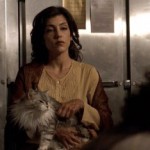Lost In Myth: “He’s Our You”—How Proxies Play a Role In Our Lives
 The concept behind Lost’s “He’s Our You” is that different people or things in our lives often take on very similar roles. In other words, multiple actors often play the same character in the movie that is your life experience. This intriguing concept actually reminds me of an episode of Seinfeld I first saw years ago. In “The Bizarro Jerry,” Elaine breaks up with a boyfriend but they decide to remain friends—similar to her relationship with Jerry whom she’d also dated prior to becoming friends. Comically, it turns out that this “Bizarro Jerry” has a couple of friends that look like George and Kramer. (For the record, both Star Trek’s “Mirror, Mirror” episode and South Park’s spoof of that episode, “Spookyfish” also explored this mirror personalities concept, which, of course, is also the idea behind the Bizarro character—the evil version of Superman.)
The concept behind Lost’s “He’s Our You” is that different people or things in our lives often take on very similar roles. In other words, multiple actors often play the same character in the movie that is your life experience. This intriguing concept actually reminds me of an episode of Seinfeld I first saw years ago. In “The Bizarro Jerry,” Elaine breaks up with a boyfriend but they decide to remain friends—similar to her relationship with Jerry whom she’d also dated prior to becoming friends. Comically, it turns out that this “Bizarro Jerry” has a couple of friends that look like George and Kramer. (For the record, both Star Trek’s “Mirror, Mirror” episode and South Park’s spoof of that episode, “Spookyfish” also explored this mirror personalities concept, which, of course, is also the idea behind the Bizarro character—the evil version of Superman.)
Technically, since these episodes all deal with the opposite of the characters they supposedly represent, they are variations on the “he’s our you” theme I’m looking to explore here. For a more direct comparison, a later Seinfeld episode actually provides a better example. In “The Junk Mail, “ we are introduced to a character named Frankie Merman who was Jerry’s friend from summer camp and, because of his sidekick role, is referred to as “the summer George.” (In what seems to be a strange coincidence, the episodes of “Bizarro Jerry,” “Mirror, Mirror” “Spookyfish” and even “The Junk Mail” all premiered during the month of October. Presumably, the idea of alternate versions of ourselves is kind of creepy and therefore air as Halloween episodes.)
Since the Seinfeld characters are so familiar to us, the show itself makes for a good metaphor of the “he’s our you” theme. Even before either of these Seinfeld episodes aired, I often referred to one of my friends as “the George Costanza of my Seinfeld life.” I had a Kramer too, and an Elaine, which pretty much made me Jerry. All these characters are archetypes. Archetypes are perfect examples of a personality type or group. They are the prototypes from which copies are based. Star Wars also works well in exploring how archetypes fit into our lives, which is why I used its characters to compare the mythological relationship of Lost characters in last week’s column.
In our real lives, archetypes give us a lot of clues. Besides providing insight about a person’s challenges and opportunities, our relationship to that person also tells us something about ourselves. If you look at your own life, you will likely see certain personality types who have continually challenged you. From a spiritual perspective, the purpose of these characters is to help you overcome, or at least deal with, the issues they bring up for you. When you successfully do so, these characters will either fade from your life, or, the grating part of their personality will. Sometimes however, characters leave us before we are able to solve the issue they were meant to help us fix. When this happens, a new character playing the exact same role will enter our lives to replace the first. Using Lost terminology, they would be a proxy, or substitute, for the previous one. This is how you know whether you’ve solved a particular issue—if the person who challenged you with it leaves your life, but another pops up in his place, you haven’t.
Have you ever noticed how some of your friends always seem to date the same types of people? Either someone who is lazy and expects his or her partner to do everything, or perhaps someone who is demanding or even abusive. Or, maybe you’ve noticed this pattern in your own relationships. Perhaps you’ve worked a number of different jobs, but always have an obnoxious boss, or a boss that doesn’t respect you or overworks you. You may keep switching jobs, but until you step up and stand up for yourself, you will continually find yourself with the same boss. One will just be a proxy for another.
These roles play out with our friends too. If you have a friend who’s always sponging off of you, even if you manage to get them out of your life, if you don’t put your foot down other spongers will enter your life. Ignoring the person by not returning their calls or emails is not dealing with the issue. You must communicate. It can be as simple as telling the person that while they mean a lot to you, you cannot continually support them with money, time, or whatever. Of course, their reaction may not be so simple, but hold your ground. Be caring and respectful, but expect the same of them. If they don’t change, then you can cut them out of your life. How can you tell you’ve done all you could do? If you are not revisited by another sponger, then you did.
Now, what if the challenging archetype is someone you can’t get out of your life—a close family member or lifelong friend? Interestingly, the people who are the closest to us in our lives are often put there to help us deal with our most challenging issues. That’s why these are the people who often drive us the craziest. Their purpose is to help us overcome problems that could take a lifetime to solve—or even more than a lifetime. In fact, these are the problems that we’ve likely carried over from a previous carnation to deal with in this one.*
Like a gigantic puzzle, the universe somehow arranges for every person to meet the exact person who can help him or her to grow. And just as that person is challenging you, you are challenging him. This is why drama addicts are surrounded by people who push their buttons, why submissive types attract abusive partners, and why givers attract takers. And each of these archetypes will continue to attract the exact archetype that can help them to grow until they no longer need to.
Throughout its fifth season, Lost has illustrated the “he’s our you” or “proxy” concept from many different perspectives. It’s shown us how the returning Losties on Ajira 316 had to act as proxies for the missing survivors of Oceanic 815. More subtly, it has depicted new characters as proxies for original ones, for example, Caesar seems to be the new Jack. In “He’s Our You,” Sawyer points out that the torturer Oldham is DHARMA’s Sayid. This is the obvious reference to the title, but there is a deeper reference in the episode as well.

 Throughout his life, Sayid has continually been revisited by a particular archetype—that of a strong, confident woman who is able to mesmerize and ultimately entrap him. In “He’s Our You,” that woman is Ilana, a bounty hunter who seduces Sayid at a bar and then captures him in order to bring him to justice. Ilana is a proxy for Elsa, the woman Sayid tried to get information out of and fell in love
Throughout his life, Sayid has continually been revisited by a particular archetype—that of a strong, confident woman who is able to mesmerize and ultimately entrap him. In “He’s Our You,” that woman is Ilana, a bounty hunter who seduces Sayid at a bar and then captures him in order to bring him to justice. Ilana is a proxy for Elsa, the woman Sayid tried to get information out of and fell in love 
 with, never suspecting that she was trying to get information out of him. Elsa was a proxy for Rousseau who captured and tortured Sayid on the island in order to get information. She in turn was a proxy for Amira whose husband tricks and then beats Sayid until he will admit to torturing her. And of course, Amira is a proxy for Nadia who Sayid was supposed to torture but became so smitten by, he aided in her escape.
with, never suspecting that she was trying to get information out of him. Elsa was a proxy for Rousseau who captured and tortured Sayid on the island in order to get information. She in turn was a proxy for Amira whose husband tricks and then beats Sayid until he will admit to torturing her. And of course, Amira is a proxy for Nadia who Sayid was supposed to torture but became so smitten by, he aided in her escape. 
 In each of these cases, women have been Sayid’s one weakness—his kryptonite. Perhaps it is because of Sayid’s culture, which does not respect women to the level that they could compete with a man. Sayid will continue to experience this seductress proxy until he learns to see women as equals—seeing them for their inner as well as their out beauty. Ilana makes this issue clear when she tells Sayid that she is not a “professional” prostitute, as he had assumed, but a professional worthy of more respect.
In each of these cases, women have been Sayid’s one weakness—his kryptonite. Perhaps it is because of Sayid’s culture, which does not respect women to the level that they could compete with a man. Sayid will continue to experience this seductress proxy until he learns to see women as equals—seeing them for their inner as well as their out beauty. Ilana makes this issue clear when she tells Sayid that she is not a “professional” prostitute, as he had assumed, but a professional worthy of more respect.
So who are the proxies of your life? What are the archetypes that keep repeating over and over again? Confront them or change the way you deal with them. Then, watch them change or disappear. If you actually enjoy having the proxy continually entering your life, ask yourself if you are taking advantage of them in some way. What you might not realize is that you could be the irritating one that the proxy is trying to get rid of. Without realizing it, you may be getting energy from them at their expense. The best thing to do, in this case, is to be proactive and change yourself so that they won’t have to leave. Then, you can have a mutually beneficial relationship, which in the long run, will be better for both of you.
*See last week’s “Namaste” column.
Marc Oromaner is a New York City writer whose new book, The Myth of Lost offers a simple solution to Lost and how it provides hidden insight into the mysteries of life. He can be contacted in the discussion section of The Myth of Lost Facebook page.
The Myth of Lost is available on Amazon and barnesandnoble.com.


